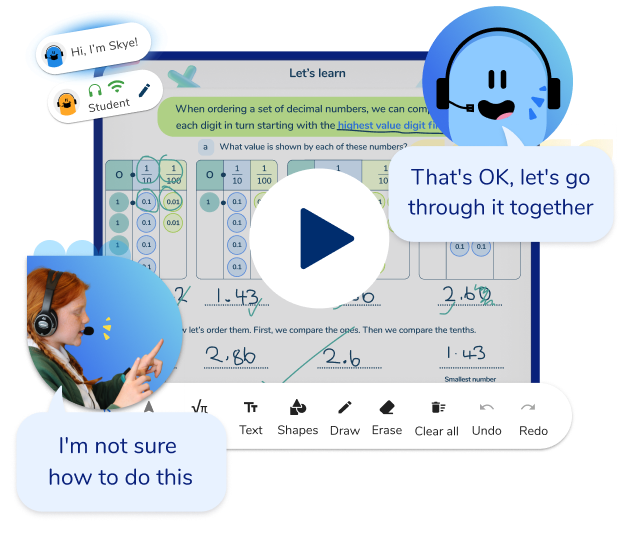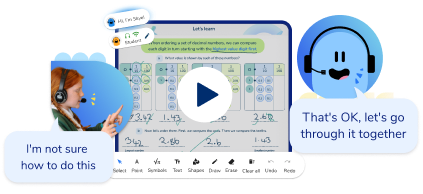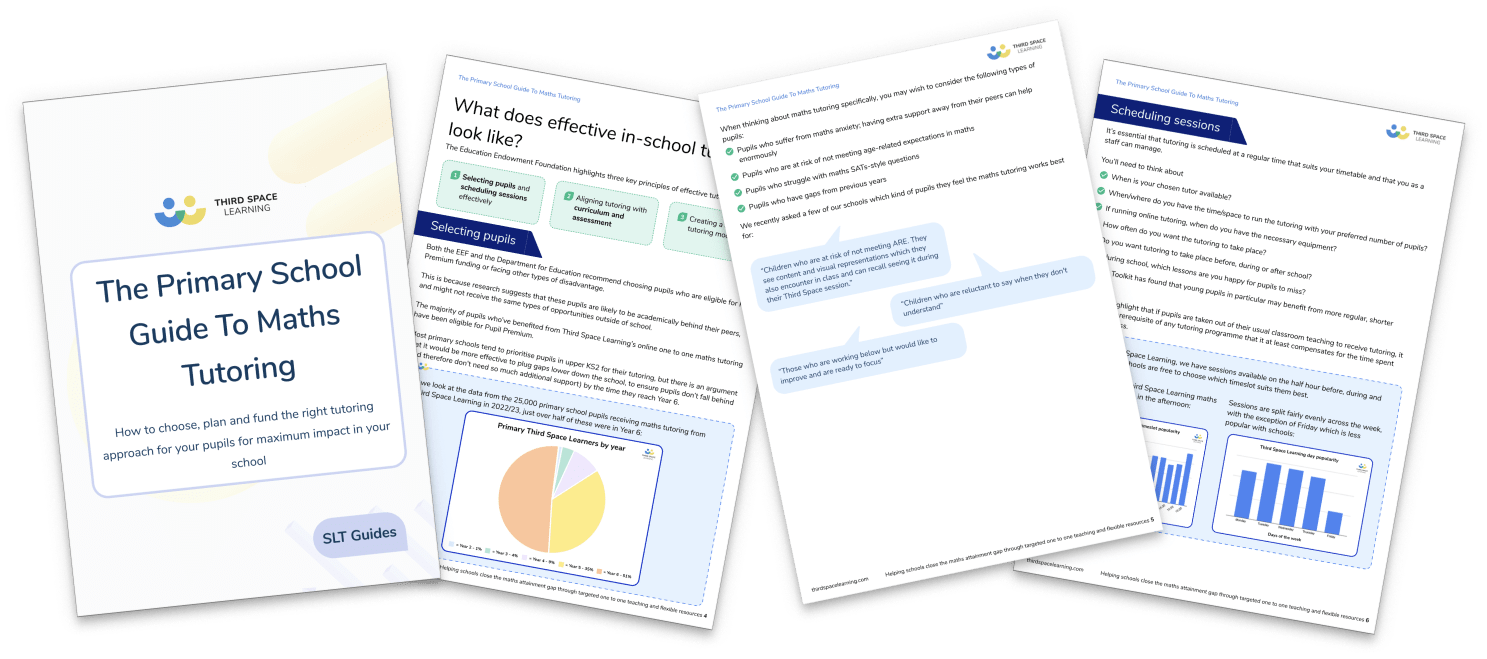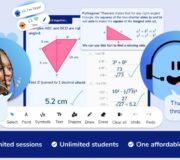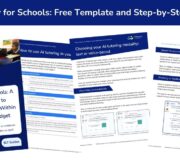What To Expect From A SATs Tutoring Programme (& The Key Questions To Ask SATs Tutors)
SATs tutoring is increasingly recognised as a valuable resource for primary schools in the lead up to Year 6 SATs. With evidence clearly highlighting the benefits of tutoring programmes, the crucial step for schools is to determine the most effective ways to use tutoring in their context to deliver the desired impact.
This guide focuses on the implementation of SATs tutoring in schools, looking at the factors that senior leaders should consider when starting up tutoring in their primary schools. Although private SATs tutors for both face-to-face and online tuition are an option for students outside of school, we focus on the considerations and benefits of school-based tuition.
What is SATs tutoring?
SATs tutoring is a way of supporting pupils in preparation for the SATs tests. SATs aim to establish how each child progresses compared to other children in the same year group.
Primary school pupils sit SATs at the end of Key Stage 1 and Key Stage 2. However, Key Stage 1 SATs are now optional and schools can choose whether or not to assess children in Year 2 against the Standards and Testing Agency’s exams.
SATs tuition can start in Key Stage 1, but specific exam-focused tuition is generally focused more on the Key Stage 2 SATs tests.
For many pupils, SATs tutoring generally starts in Year 6, however, starting KS2 tutoring earlier on in Key Stage 2 can help better prepare students struggling in maths or English.
The Primary School Guide to Maths Tutoring
Learn how to choose, plan and fund the right tutoring approach for your pupils for maximum impact.
Download Free Now!KS1 SATs
The optional KS1 SATs happen in Year 2 for children aged 6 and 7. These usually occur in the classroom and class teachers usually mark the tests themselves. Key Stage 1 SATS consist of formal assessments in maths and English across seven SATS papers. These cover:
- Reading (2 papers)
- Spelling
- Punctuation and grammar (3 papers)
- Maths (2 papers)
KS2 SATs
In the May of Year 6, children aged 10 and 11 sit their KS2 SATs. Unlike the KS1 SATS, these happen in a more formal setting. These papers are sent off for external marking. Key Stage 2 SATs also consist of seven papers:
- Reading (2 papers)
- Spelling
- Punctuation and grammar (2 papers)
- Maths (3 papers)
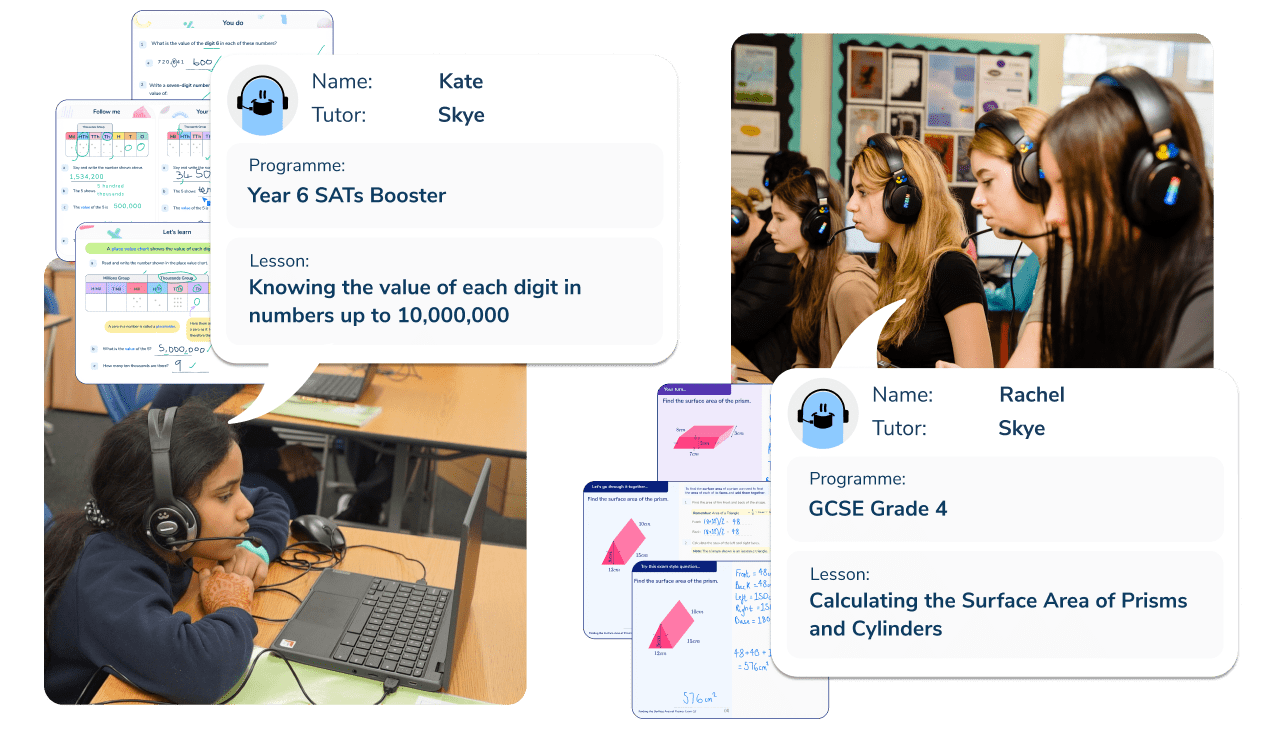
Meet Skye, the voice-based AI tutor making maths success possible for every student.
Built by teachers and maths experts, Skye uses the same pedagogy, curriculum and lesson structure as our traditional tutoring.
But, with more flexibility and a lower cost, schools can scale online maths tutoring to support every student who needs it.
Watch Skye in actionWhat SATs tutoring options are there?
For school-based tuition, there are several key decisions to consider:
- One to one or group tutoring
- Online or in-person tutoring
- Internal or external providers
One to one or group tutoring
On a one to one basis, suitably qualified teachers or SATs tutors work with one child individually, whereas small group tutoring usually involves groups of up to 6 pupils.
Both approaches can have a significant impact on a child’s progress, however, research shows that one to one tutoring consistently results in the most accelerated progress.
This is likely due to the highly personalised instruction straight from the first lesson designed to focus on an individual pupil’s learning gaps. A high level of personalisation is more difficult in a group setting where pupils may have different gaps.
Online or in-person tutoring
Both one-to-one and group sessions can be delivered in person, with the tutor and children in the same room or online SATs tutors can teach remotely using video conferencing tools or online classroom platforms to work together.
There is currently no evidence to suggest that in-person or online tutoring is more effective – it’s down to the school’s preference.
Online tutoring
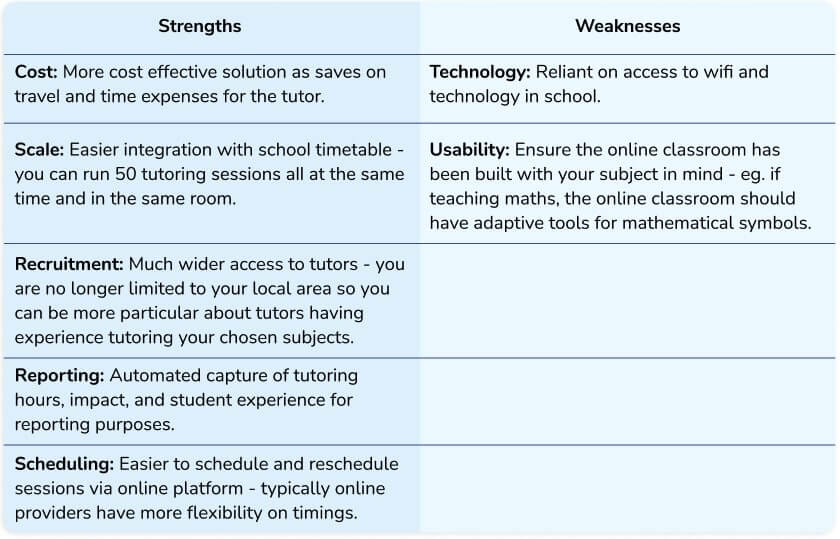
In person tutoring
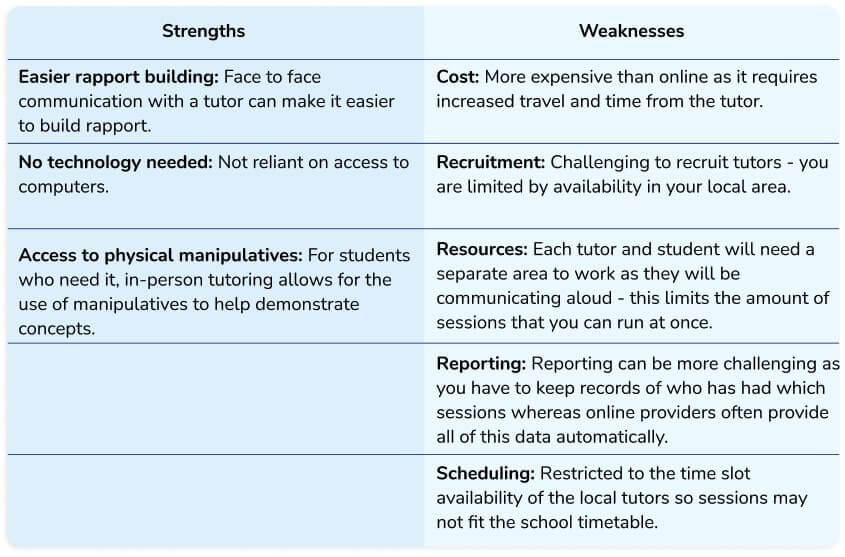
Internal or external providers
If you are looking to start up SATs tutoring with internal staff, there are some benefits to this. Existing staff will likely find it easier to build the rapport and supportive environment necessary for tutoring.
However, teaching staff and assistants are likely already stretched and unable to take on this additional workload.
School-led tutoring comes with a lot of planning and administrative tasks, such as diagnostic and ongoing assessment, training and CPD for SATs teachers, timetabling and scheduling, hiring, interviewing, and so on – whose shoulders will this fall to?
External providers can alleviate some of these pressures. Advantages of external learning interventions include:
- Reduced impact on staff workload;
- Management of tutoring, hiring and training;
- Monitoring progress and reporting;
- More ratings and reviews.
Is SATs tutoring worth it?
Primary school tutoring for SATs can benefit all pupils and prepare them for their SATs exams. But, it is particularly helpful for pupils with gaps in their learning. Benefits of SATs tutoring include:
- Improved SATs results: Carefully tailored tuition has been demonstrated to improve test scores for these children.
Third Space Learning found that 93% of teachers felt Third Space Learning lessons helped their pupils achieve higher SATs scores, with students on average achieving higher scores in their maths papers than the rest of their year group and the national average.
- Targeted preparation: Tailored specifically to the content and format of the exams, SATs tutoring helps pupils understand the test structure, SATs-style questions and the specific skills and knowledge they need to demonstrate what they are capable of within the exam format.
Third Space Learning’s SATs programme teaches pupils key exam skills while tailoring revision to pupils’ learning gaps.
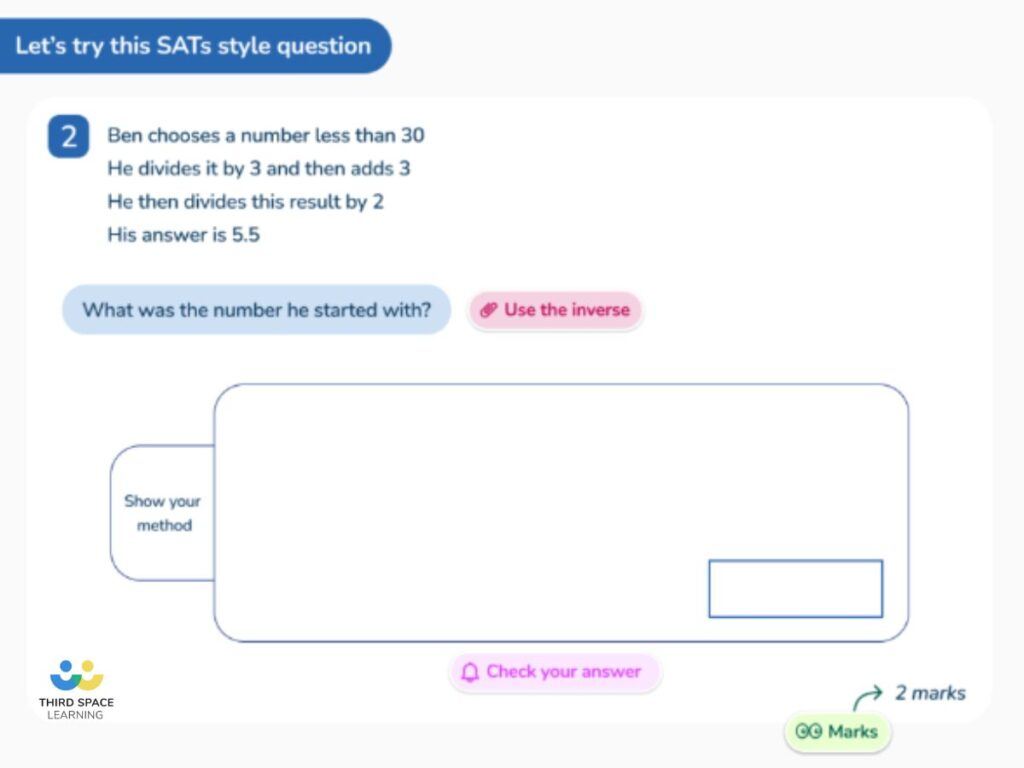
- Personalised instruction: Working with students on a one to one basis enables tutors to quickly identify pupils’ areas of strength and their learning gaps. The best SATs tutoring programmes will have diagnostic assessments to identify any gaps to target to meet the specific needs of the pupils.
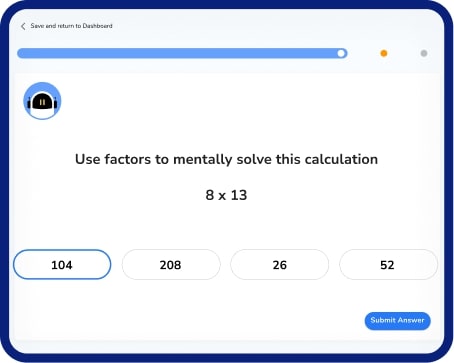
- Increased confidence: Tuition can help boost children’s confidence and raise self-esteem, particularly in challenging topics. Additional support can also help reduce self-doubt and anxiety, and create a growth mindset when tackling the exams.
This can be especially helpful in maths, which can often become a source of anxiety for pupils. Creating a nurturing and safe environment for maths tutoring may alleviate maths anxiety and provide a positive learning experience. This could positively impact pupils beyond their SATs exams and help them with the transition to secondary school. - Exam preparation: SATs are likely the first formal test pupils will sit. Regular exposure to questions similar in style to SATS questions can help pupils develop problem-solving strategies while building confidence and improving time management skills.
- Increased motivation and confidence: Tutors can provide children with guidance and encouragement. Pupils can see the progress they make, through the regular feedback from tutors.
“The use of Third Space Learning’s one to one tutoring supported children in developing their skills and more importantly, confidence in maths, particularly in the build up to SATs.”
Headteacher, Exeter
When should schools start SATs tutoring?
Determining when to start a SATs tutoring programme depends on a range of factors, including:
- The level of preparation the children have had previously;
- Where they are in relation to the targets they are aiming for;
- The availability of time to undertake the tuition.
School leaders must evaluate the current curriculum and provision provided for pupils so far. Some schools provide comprehensive SATs preparation within regular lessons, while others do not have the resources or capacity to dedicate to SATs.
Once this is established, school leaders and class teachers can select the children who will benefit most from tuition.
Individual learning needs of the pupils are also important factors. For pupils with significant learning gaps or specific learning difficulties, intervening often and early may be the best approach.
It’s important to understand that there is no set time when tuition should begin. It varies from pupil to pupil. Some students will benefit from tuition over a longer period, whilst others may only need a shorter catch up tuition programme to fill any gaps.
However, as one to one online maths tutoring providers, we speak to thousands of schools every year about their SATs preparation and one recurrent key theme is that primary school teachers wish they had started their SATs lessons and preparation earlier in Year 6. Many teachers even wish they had worked on more basic mathematical skills to fill learning gaps from Year 5 and earlier.
What to expect from a SATs tutoring programme
- High quality and delivered by qualified tutors: Any school-based tuition should be run by an experienced tutor or member of staff with high-quality, national curriculum-aligned resources. If non-specialist staff are delivering tutoring, they are most successful when they receive training and support from qualified and experienced teachers. Of course, tutors should have both minimum qualifications and security checks, including DBS, to work closely with pupils.
- Personalised support: Tutoring programmes provide the opportunity for much more individualised attention than is usually possible in a whole class environment. Tutors should identify strengths, weaknesses and gaps to tailor the tuition to be specific to the needs and learning styles of each child.
- Familiarise pupils with the exam format: Tutors should support pupils in selecting and using appropriate strategies to approach questions in the SATs exams. Children can focus on past questions and practice tests, looking at the different ways to approach and answer the questions, in preparation for any similar questions which may come up.
- Timed conditions: Pupils should have the opportunity to work under the conditions they will be working in during the test. Working under timed conditions can help children reflect on their time management. This isn’t something to advocate all the time, however, it is an important skill that will help them in future tests such as GCSEs and A-Levels.
- Use evidence-informed strategies: A good tutoring programme takes relevant research into account and uses up-to-date pedagogical practices.
- Focus on the highest impact topics: A SATs tutoring programme will typically focus on the core subjects of maths and English and provide targeted support to help children to improve their skills and understanding in these areas.
Every year, the curriculum team at Third Space Learning analyse the data and identify the highest impact SATs revision topics for maths, organised by priority. This is what informs our SATs programmes and can be used to inform your own maths revision for Year 6. - Support pupil wellbeing: Tuition programmes should build motivation, confidence and a growth mindset. Some children can feel very anxious about the formality of the tests, but with the appropriate support, pupils can approach the tests confidently.
10 key questions to ask your SATs tutor
If your school is about to embark on a SATs tutoring programme, you will want to be sure that the tutor is right for your school’s needs. Asking the right questions regarding the level of expertise, knowledge of the SATs exam format and teaching methods is essential to gauge this.
Here are some essential questions to ask before making your decision:
- What is your experience in preparing students for the KS1/KS2 SATs exams?
- How many years experience do you have in tutoring?
- Are you familiar with the KS1/KS2 SATS curriculum and the format of the exams?
- What teaching methods and strategies do you use to help students prepare for the SATs exams?
- How do you ensure that a student’s strengths and weaknesses are accurately assessed, to ensure they receive the best preparation?
- Do you use diagnostic assessments?
- How will you tailor your sessions to meet the needs of each child?
- How will you monitor pupil progress throughout the programme?
- What resources will you use to support your teaching during the tutoring sessions?
- How do you build confidence in your students and help to reduce any anxiety towards SATs that they may be feeling?
Activities for Year 6 maths SATs
When structuring a SATs tutoring programme for maths, it is important to consider which activities are most likely to engage pupils and, therefore, be the most effective in producing results.
Here, we discuss some of the different activities which can be included in a SATs tutoring session.
Question analysis: Look at sample questions together and discuss strategies for approaching and solving them. This will help pupils to build up a range of strategies, whilst also building confidence in answering the types of questions they will experience in the SATS exam.
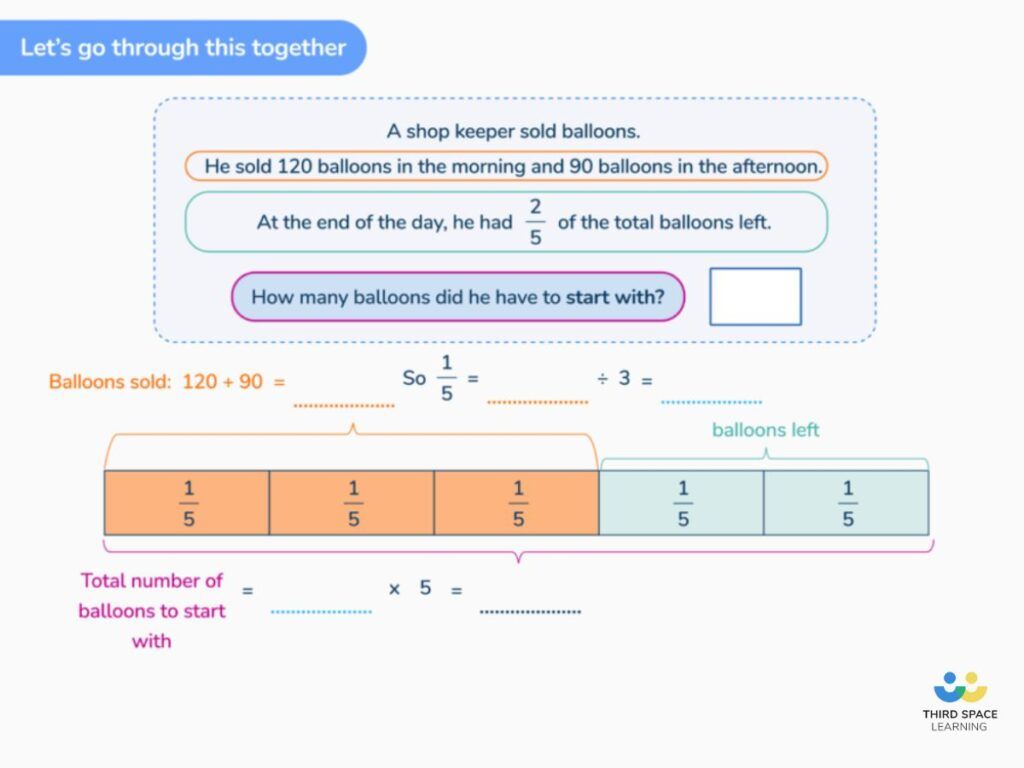
Practice tests: If children are exposed to tests in the same style and format as the Year 6 SATS, they will become less daunting and children will feel more confident in their ability to approach them successfully.
Download our KS2 maths SATs practice papers for FREE practice tests.
Concrete resources: Use concrete resources and visual images to help children to really understand the maths behind any questions they do. Although pupils won’t be able to use concrete resources during the tests, it can build comprehension and confidence with new topics. However, pupils will be able to draw concrete representations, such as bar models, to help them during the tests so ensure this is included in SATs preparation.
Discussion and reasoning: One to one and small group tutoring offers the opportunity for rich, purposeful maths talk where pupils can verbalise their maths in a supportive environment. This isn’t always possible in a whole class environment and pupils may feel self-conscious doing this in larger groups.
“[Third Space Learning’s SATs revision programme] is very effective at preparing Year 6 pupils for SATs because the children have to read the reasoning questions and explain their reasoning verbally to their tutors.”
Headteacher, London
Games (online and physical): Integrate maths games into the tutoring sessions. These are enjoyable and particularly good for improving mental maths skills and reinforcing key concepts. These may be just a few minutes at the end of the session, but children can be encouraged to play the games outside of the session, with their families at home.
Here are some games and activities that might be suitable for your SATs tutoring programme:
- Place value games for KS1 and KS2
- KS2 Maths Games and Activities Pack
- Times Tables Games Printable Resources
Here are some of the other resources we have put together to help with the SATS preparation:
Some secondary schools use SATs scores to help stream Year 7 pupils, whilst other schools carry out a separate assessment once children start secondary school. SATs results are also used to forecast a predicted grade for GCSE, which is again important if schools are using this to stream cohorts.
SATs are more important for schools than they are for children, with the results used to measure attainment and a child’s progress and as a measure to show how schools are performing academically.
A score below 100 means a child is working towards the expected level for that year group. A scaled score of 100 or more shows that a child is working at the expected level. A score of 110 or higher means a child is working at greater depth or higher standard.
The best way to ensure success in the Year 6 SATs is to ensure that the key topics have been mastered and that pupils are familiar with the exam format and question styles. In maths, take account of the weighting of different topic areas so that pupils are confident in the topic areas which will definitely come up. For example, calculation and fractions, decimals and percentages are two areas which carry significant marks. Ensuring children are confident in these areas will have a significant impact on results.
DO YOU HAVE STUDENTS WHO NEED MORE SUPPORT IN MATHS?
Skye – our AI maths tutor built by teachers – gives students personalised one-to-one lessons that address learning gaps and build confidence.
Since 2013 we’ve taught over 2 million hours of maths lessons to more than 170,000 students to help them become fluent, able mathematicians.
Explore our AI maths tutoring or find out about primary school tuition for your school.
